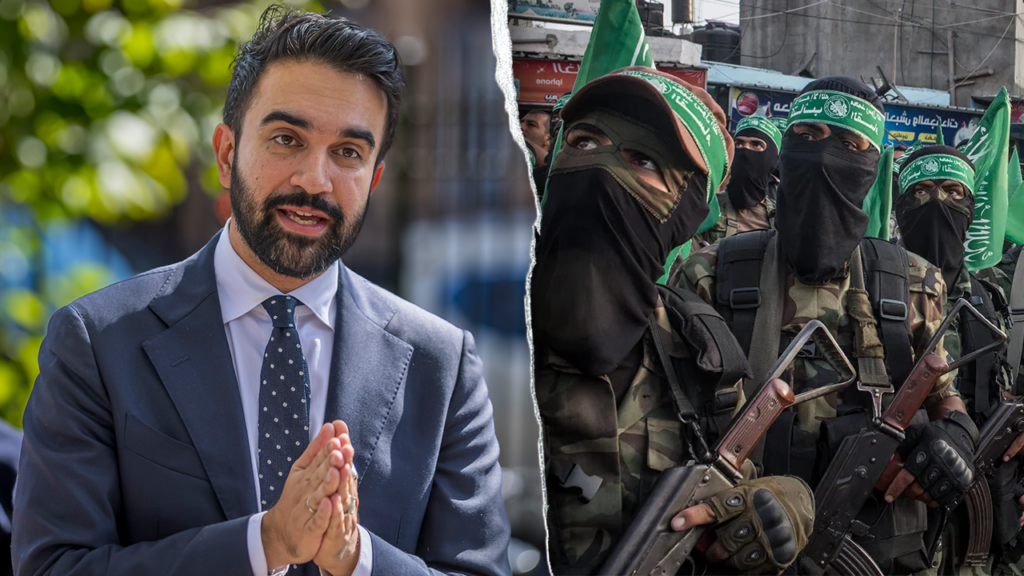The ongoing tension surrounding the Israel-Palestine conflict continues to permeate American politics, particularly in the context of the upcoming mayoral election in New York City. Democratic mayoral candidate Zohran Mamdani faced backlash from the Israeli Foreign Ministry after his recent comments on the second anniversary of the Oct. 7 terrorist attacks. Mamdani’s remarks criticized both Israeli policies and the broader U.S. involvement, leading to allegations of anti-Semitism and complicity with Hamas narratives. This incident highlights the complex interplay between local elections and international political sentiments.
| Article Subheadings |
|---|
| 1) Mamdani’s Controversial Statement |
| 2) Backlash from the Israeli Foreign Ministry |
| 3) Public Reaction and Responses |
| 4) Implications for the Mayor’s Race |
| 5) Broader Context of Anti-Israel Sentiments |
Mamdani’s Controversial Statement
On the anniversary of the devastating attacks perpetrated by Hamas, Zohran Mamdani made a social media post that garnered immediate attention. He condemned the attack that resulted in over 1,100 Israeli deaths, highlighting the tragedy and mourning the loss of innocent lives. However, he pivoted his message to criticize Israel and the United States, calling for an end to what he characterized as “occupation and apartheid.” This post appeared to align his views with those who advocate for Palestinian rights, but also risked alienating a significant portion of the Jewish community and supporters of Israel. His comments provoked a wide range of reactions, which have since fueled a heated debate in the lead-up to the election.
Backlash from the Israeli Foreign Ministry
The Israeli Foreign Ministry did not take kindly to Mamdani’s remarks, labeling him a “mouthpiece for Hamas propaganda.” They accused him of disseminating false narratives that downplay the terror inflicted upon Israel and propagate anti-Semitic sentiments. In their statement, they argued that Mamdani’s words serve to “normalize antisemitism” and suggested that his comments were an insult to those who lost their lives during the attacks. The Ministry’s reaction epitomizes the sensitivities surrounding criticism of Israel, especially from political figures in the United States—where the Israel-Palestinian conflict often intertwines with local political discourse.
Public Reaction and Responses
Following the Foreign Ministry’s critique, public responses to Mamdani’s statements varied widely. Advocates for Palestinian rights commended his willingness to address what they perceive as ongoing injustices faced by Palestinians. On the other hand, many Jewish community leaders and activists expressed alarm over his comments. One prominent Jewish activist warned that Mamdani’s election could lead to a “mass exodus” of Jewish residents from New York City, citing his controversial positions on issues related to Israel and anti-Semitism. The divide manifests not just in political words but shifts towards action, with some groups taking steps to mobilize voters against Mamdani.
Implications for the Mayor’s Race
Mamdani’s candidacy is notable not just for its focus on social justice and equity but also for the contentious atmosphere that surrounds it. His political ideology, which aligns with socialist principles, advocates for systemic change. However, as evidenced by the reaction to his comments, these principles are contentious in a city with a significant Jewish voter base. The mayoral race is about much more than just local governance; it is reflective of larger national narratives concerning race, identity, and foreign policy. The fallout from Mamdani’s comments could reshape alliances and voting behaviors in New York City, particularly among younger, progressive voters versus older, more traditional demographics.
Broader Context of Anti-Israel Sentiments
The current political climate reveals a growing division within American society regarding opinions on Israel and the Palestinian territories. Mamdani’s statements come amidst an ongoing conversation about racial and social justice movements, many of which intersect with international issues. The usage of phrases like “globalize the intifada” has polarizing effects, with many elucidating the struggle of Palestinians as akin to civil rights movements. This complexity makes it vital for political candidates like Mamdani to navigate carefully, balancing their progressive platforms with the historical and emotional weight surrounding these issues. The evolving discourse suggests that the debates over Israel-Palestine, while rooted in international relations, have found fertile ground in local political contests.
| No. | Key Points |
|---|---|
| 1 | Mamdani’s comments prompted criticism from the Israeli Foreign Ministry, which labeled him as a supporter of Hamas propaganda. |
| 2 | His statements have polarized public opinion, especially among Jewish community leaders, who warn of potential repercussions if he is elected. |
| 3 | The race for mayor highlights broader national conversations about anti-Israel sentiments and the intersection with local politics. |
| 4 | Critics argue that such polarizing rhetoric could lead to increased divide in communities across New York City. |
| 5 | Mamdani’s background in social justice advocacy contrasts with the traditional political views held by many voters regarding Israel. |
Summary
As the New York City mayoral race continues, the complexities of foreign policy and local governance are becoming increasingly intertwined. Zohran Mamdani’s remarks, particularly in conjunction with the anniversary of the tragic events on October 7, raise significant questions regarding the role of anti-Israel sentiments in American politics. The varied responses to his statements illustrate a divided landscape, where varying ideologies impact the political choices of a diverse electorate. As this election unfolds, it is likely that the discourse around Israel and Palestine will remain a pivotal element of the conversation.
Frequently Asked Questions
Question: Who is Zohran Mamdani?
Zohran Mamdani is a Democratic mayoral candidate in New York City who is known for his socialist views and advocacy for social justice issues.
Question: What did Mamdani say about the October 7 attacks?
Mamdani acknowledged the attacks as a horrific crime against Israelis, mourning the loss of lives and advocating for the safe return of hostages.
Question: How has the Israeli Foreign Ministry reacted to Mamdani’s comments?
The Israeli Foreign Ministry criticized Mamdani, accusing him of promoting Hamas propaganda and normalizing anti-Semitism through his statements.


